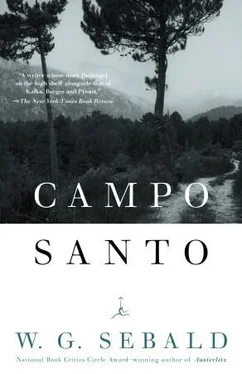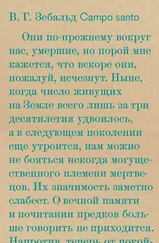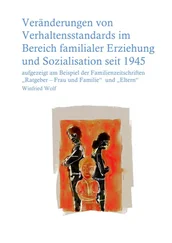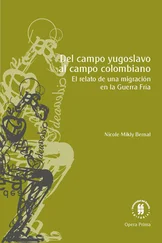In September 1996, on a walking tour on the island of Corsica, I happened to be sitting during my first rest day in a grassy clearing on the outskirts of the Aitone forest, which lies at high altitude. I looked across hollows and valleys, deep blue to almost black in their depths, and saw a semicircle of granite crags and peaks, many of them towering up to a height of two and a half thousand meters or more. To the west was a wall of cloud looming darker and darker, but as yet the air was so still that not a blade of grass stirred. An hour later, when I had reached Evisa just as the storm broke and had taken refuge in the Café des Sports there, I spent a long time looking through the open door at the torrential rain slanting down into the street. The only other guest was an old man already equipped for the winter months in a woolen jacket and an old army anorak.
His eyes, dimmed by cataract, which he tilted slightly toward the light as a blind man would, were of the same ice-gray as the pastis in his glass. It did not seem to me that he had noticed the woman of curiously theatrical appearance who passed by under her umbrella a little later, or the half-grown pig that was following her. He kept looking up all the time, and as he did so he turned the six-sided stem of his glass jerkily with the thumb and forefinger of his right hand, as regularly as if he had the clockwork of a watch inside his breast instead of a heart. The sound of a kind of Turkish death march came from a cassette recorder behind the bar, and now and then a high-pitched laryngeal male voice sang, reminding me of the first musical sounds I ever heard in my childhood.
For immediately after the war there was almost no music at all in the village of W. on the northern outskirts of the Alps, apart from occasional performances by the severely depleted yodelers’ group and the solemn music of the wind band, itself now reduced to a few elderly instrumentalists, which played for processions going around the fields and on Corpus Christi Day. Neither we nor our neighbors had a gramophone at this time, and the new Grundig radio that Aunt Therés in New York bought us just before I began school in 1950, for the fabulous sum of five hundred marks, was hardly ever switched on during the week, probably because it stood in the parlor and no one used the parlor on working days. Early on a Sunday morning, however, I would hear the Rottachtal ensemble or other local musicians on the radio with their dulcimers and guitars, for my father, who came home only on weekends, had a particular liking for this kind of traditional Bavarian folk music, which to me has taken on in retrospect the character of something terrible which I know will pursue me to my grave. A few years ago, for instance, after spending a restless night in the Hotel Kaiserin Elisabeth in Starnberg, I was woken from the sleep into which I fell at last toward morning by a clock-radio broadcasting two such Rottachtal folksingers, whom I could only imagine, judging from the sounds they produced from the radio’s tinny interior, as deformed and infirm; they were performing one of their merry songs about martens and foxes and all kinds of other animals, with each of its many verses ending in a Holadroo-yoohoo, holladree-yo .
The ghostly impression made on me by the Rottachtal singers trapped inside the radio that Sunday morning, when all was overcast by dense mists rising from the lake, was reinforced in a most uncanny way a few days later after my return to England, when I was searching through a box full of old photographs in a junk shop near Bethnal Green underground station in the East End of London, and almost to my horror came upon one of those picture postcards produced by the International Postal Union around the turn of the century, showing a painted panorama of the Allgäu mountains in snow and in front of it the Oberstdorf folk dancers in their traditional costumes, adorned with embroidered sprigs of edelweiss, tufts of chamois hair, cockerel feathers, silver talers, stag’s teeth, and similar tribal emblems. On finding this card, which had no message written on the back and which must certainly have gone on a long journey, I really felt as if the ten costumed men and women of Oberstdorf had been lying in wait for me here in their dusty English exile, just to remind me that I would never be able to escape the early history of my native land, where costumes and tradition played a not insignificant part.
After we had moved, in December 1952, from our home in W. to the small town of S. nineteen kilometers away, with the aid of the Alpenvogel moving van, my musical horizons were gradually extended. I listened to Bereyter, our teacher, who always took his clarinet with him in an old kneesock on our class outings, just like the philosopher Wittgenstein, and played a number of beautiful pieces and arching melodic phrases, although without knowing that they were from the works of Mozart or Brahms, or an opera by Vincenzo Bellini. Many years later, when by one of those mere coincidences that are really no such thing I switched on the car radio one night while driving home, I was just in time to hear the theme from the second movement of Brahms’s Clarinet Quintet that Bereyter had so often played, and recognized it again after all the time that had passed. At that moment of recognition I felt touched by the sensation, so rare in our emotional lives, of almost complete weightlessness.
Such was the enthusiasm inspired in me by Bereyter that at the time, in the summer of 1953, I wanted to learn the clarinet myself. But we had no clarinet at home, only a zither, so I had to go twice a week past the long wall of the riflemen’s barracks to Ostrachstrasse, where Kerner the music teacher lived in a little terraced house with a tiled roof, and a dark, turbulent sawmill canal flowing little more than five or six meters behind it, a canal from whose waters drowned bodies had quite often been pulled, as I could never help remembering at the sight of it, the most recent being the body of a boy of six whose brother was in my class at school.
Kerner the music teacher, a rather gloomy and melancholy man, had a daughter of my own age called Kathi, a child prodigy known even abroad who had appeared in Munich, Vienna, Milan, and God knows where else. Whenever I came for my zither lesson she was out of sight behind a closed door, seated under her mama’s supervision at the grand piano, which filled the whole parlor. The mighty rise and fall of the cascading notes of the sonatas and concertos she was practicing made their way into the cramped little cubbyhole of a study where I was toiling away on the zither, while Kerner sat beside me, impatiently tapping his ruler on the edge of the table when my fingering was wrong. Playing the zither was a torment to me, and the zither itself a kind of rack on which you twisted and turned in vain and which left your fingers crooked, even leaving aside the ridiculous nature of the little pieces written for the instrument.
Only once, and at the end, as it was to turn out, of my three years of zither lessons, did I willingly take out of its case the instrument I had come to hate: when my grandfather, whom I loved dearly, lay dying during the first föhn storm after the Siberian winter of 1956, and as he drowsed, half unconscious already, I played him the few pieces I did not loathe from the bottom of my heart, ending, as I still remember, with a slow ländler in C major, which even as I played it, or so it appears to me now, seemed to be very long drawn out and to go on in slow motion as if it would never end.
I do not think that at the time, aged twelve, I could have guessed something I read much later, in one of Sigmund Freud’s studies unless I am much mistaken: an observation that immediately struck me as convincing, suggesting that the deepest secret of music is that it is a gesture warding off paranoia, and we make music to defend ourselves against being overwhelmed by the terrors of reality. But after that April day I refused to go to any more zither lessons or even to touch the instrument again.
Читать дальше












